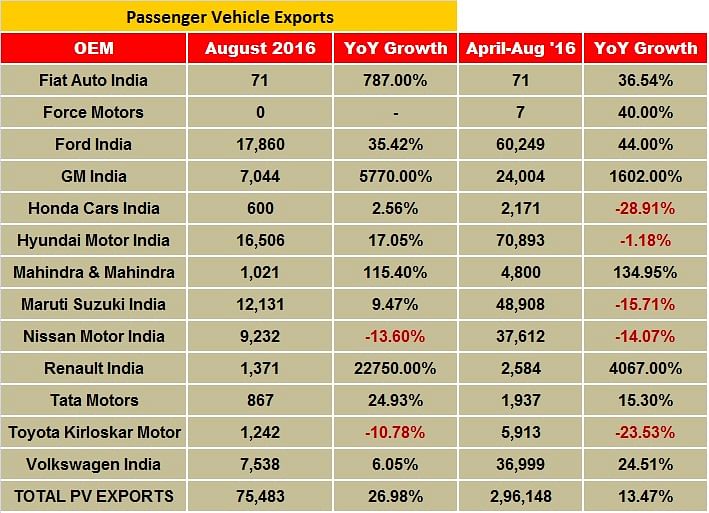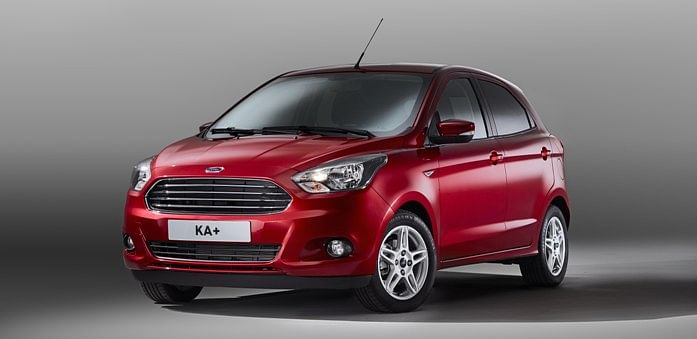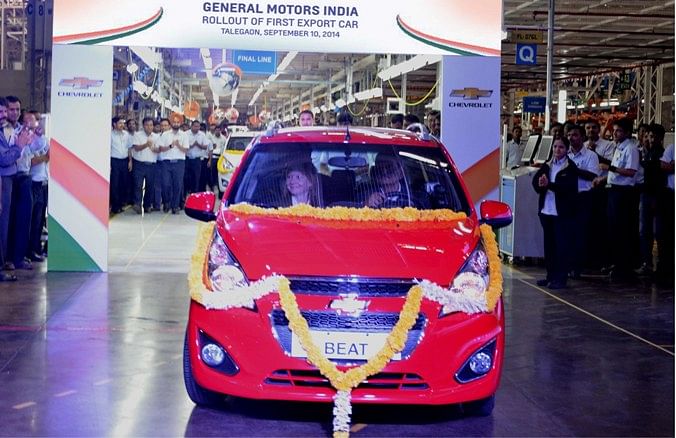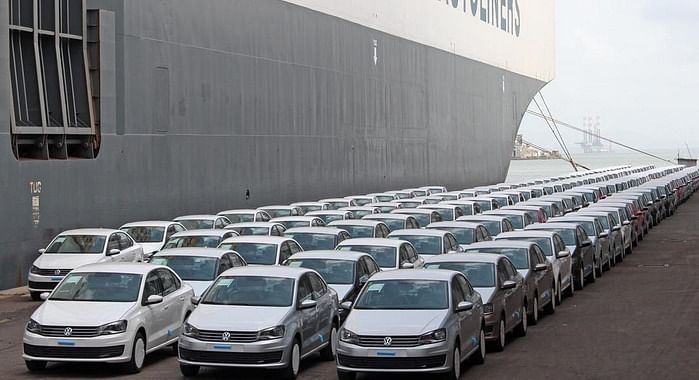Ford beats Hyundai as top Indian passenger vehicle exporter in August
A close look at industry sales data reveals that Maruti Suzuki India was the third largest exporter in August with shipments of 12,131 units, followed by Nissan Motor India (9,232), Volkswagen India (7,538) and GM India (7,044).
Ford India has driven past Hyundai Motor India on the export front in August 2016. The Chennai-based carmaker shipped a total of 17,860 units compared to Hyundai Motor India’s 16,506 units last month.
A close look at industry sales data reveals that Maruti Suzuki India was the third largest exporter in August with shipments of 12,131 units, followed by Nissan Motor India (9,232), Volkswagen India (7,538) and GM India (7,044).
Ford India which, like Volkswagen India, Nissan Motor India and GM India, exported more cars in FY2015-16 than it sold in the domestic market, sees its Make-In-India export operation as a critical part of its investment in this part of the world. Ford India’s export programme has, for over two years, breezed along thanks to global demand for the EcoSport SUV, but is now getting a new charge thanks to the new-generation Figo hatchback and the Aspire sedan.
Clearly, for all these four global automakers – two American, one German and the other Japanese – the make-in-India manufacturing strategy is helping them leverage their considerable investments in their India plants.
Hyundai Motor India and Maruti Suzuki are India’s No. 1 and No. 2 passenger vehicle exporters respectively. In FY2015-16, the Korean carmaker shipped a total of 162,221 units while Maruti Suzuki despatched 123,850 units to overseas markets. They continue to perform at the same pace in the April-August 2016 period – Hyundai has exported 70,893 units while Maruti has sent 48,908 vehicles abroad.

Ka+ to drive Ford India exports in future
Even as the Ford EcoSport (35,517 units) has toppled the Nissan Micra (31,605 units) as the most exported car in the fiscal so far, Ford India’s future export performance would hinge on the new Figo, which is now being sold as the Ka+ in Europe.
The company’s exports received a boost in end-July when it began shipping the new Figo, manufactured at its Sanand plant, to various European markets. Ford India produces the second-generation Figo hatchback and the new Figo Aspire sedan models at its Sanand plant, which is an integrated manufacturing facility.

Between the new Figo hatchback and the Aspire sedan, the production capacity for domestic and exports is 240,000 units at the Sanand plant. The Detroit-based carmaker has invested US$ 1 billion in the Sanand plant as part of its goal to triple exports from India in the next five years. We expect the Ka+ to be the new export driver for Ford India in the long run as the carmaker is now planning to shift the production of EcoSport to Europe by the end of 2017.
The move has been dubbed as part of a major rejig in various manufacturing locations to ensure optimum capacity utilisation across various plants in the world.
Rising Beat shipments new spark for GM India exports
The other American carmaker in India – GM India – is also benefiting from the same export-led growth strategy. After failing to ignite much interest for its cars in the domestic market, GM India had some time ago shifted its focus on exports to better utilise the manufacturing capacity investments made in the country. Now, its renewed strategy seems to have paid off as the Chevrolet Beat, which is sold as the Spark in many countries globally, has become one of the most exported cars from India in the ongoing fiscal year 2016-17.
Latest export statistics reveal that GM India, which first began vehicle exports from India to Chile in September 2014 (pictured above), has shipped over 24,000 units of the Beat between April-August 2016, making it the fourth most exported car from India.

Ford India with the EcoSport tops the list with over 35,000 units shipped, followed by the Nissan Micra with more than 31,000 units and the Volkswagen Vento with over 29,000 units in the fiscal so far.
The Beat, which is badged as the Spark outside India is manufactured at GM India’s Talegaon facility in Maharashtra, which has a manufacturing capacity of 130,000 vehicles.
Volkswagen: Five years of made-in-India car exports
For German carmaker Volkswagen, which celebrated five years of car exports from India in March 2016, its export programme is a key growth driver for the company. Starting with South Africa in 2012, the carmaker has expanded its shipments to over 35 countries across Asia, Africa, North America and South America. In 2015, the company exported over 55 percent of its cars produced in the Pune plant to over 35 countries across four continents while serving as the hub for parts and components to Malaysia. The range of cars being exported includes left-hand drive as well as right-hand drive Polo and Vento cars. Mexico has been the single largest export market for Volkswagen India where over 80 percent of the export volume was shipped in 2015.

Commenting on the export drive, Dr Andreas Lauermann, president and MD, Volkswagen India, had said: “Volkswagen set up its Indian operations especially for the domestic Indian market and we still continue to focus primarily on our local customers and their demands. However, with fluctuations in the domestic demand and the currency exchange, it became necessary for us to establish a second strong leg of our operations here in India. Since a Volkswagen made anywhere in the world follows the same quality and engineering standards, we were able to impress several export markets and create a demand there with our cars built in India. The acceptance and rising demand from a variety of markets and consumers from Asia to America stands a testimony to the global standards and state-of-the-art manufacturing that we undertake here at the Pune Plant.”
Volkswagen India, which has invested approximately 800 million euros in its Chakan plant, near Pune, currently manufactures the Polo, Vento, Ameo and Skoda Rapid and also assembles the 1.5-litre TDI engine at this plant. In March this year, growing demand from export markets and for manufacture of the new Ameo sedan, Volkswagen India began a third shift at the plant.
Nissan expands its export markets
Like the other global players, Nissan too banks on its India export growth strategy. In end-July, the carmaker expanded its exports programme to a new market – South Africa – when it shipped 197 Datsun Go+ MPVs, followed by another 111 units on August 26.
Sales of the Datsun Go+, produced at the Renault-Nissan Alliance plant in Oragadam near Chennai, began on August 31 in South Africa. Commenting on the latest export model, Guillaume Sicard, president, Nissan India Operations, said: “Following on the success of the India-built Datsun Go’s launch into the small car segment in South Africa, the Go+ is another example of our Make in India models making a mark in overseas markets. Our exports continue to help Nissan build its presence in India and grow the local economy.”
Since operations began at the plant in 2010, over 620,000 cars have been exported overseas. Currently, the Chennai plant exports vehicles to 106 countries around the world. Recent export models include the Datsun Go, Go+, Redigo and Nissan Sunny, among others. In July 2016, the company shipped Datsun Redigos to Nepal. This was followed by export of the Redigo to Sri Lanka in August. The Renault-Nissan Alliance Chennai plant, which has a manufacturing capacity of 480,000 units per annum, is the Alliance’s largest plant in the world and is among the leading passenger car exporters in India. In 2015-16, Nissan Motor India exported a total of 111,612 units. In the April-August 2016 period, it has despatched 37,612 units, down 14 percent year on year.

Recommended:
- India surpasses China in passenger car exports
- Can India’s auto industry live up to the AMP export target?
RELATED ARTICLES
TVS Motor: The New King of India's Electric 2-Wheeler Market
January 2026 sees TVS Motor solidify its position with 34,558 units Bajaj struggles to keep pace.
Electric PV Sales Stabilize after GST Hit
Fresh FADA data shows January 2026 registrations surging 55% year-on-year, with Tata, JSW MG, and Mahindra all posting s...
Bajaj Chetak production plunges by 47% in July due to shortage of rare earth magnets
Bajaj Auto manufactured 10,824 Chetaks last month, 9,560 fewer units than the 20,384 Chetaks produced in July 2024. As a...






 By Ajit Dalvi
By Ajit Dalvi
 21 Sep 2016
21 Sep 2016
 59265 Views
59265 Views














 Angitha Suresh
Angitha Suresh


 Arunima Pal
Arunima Pal


